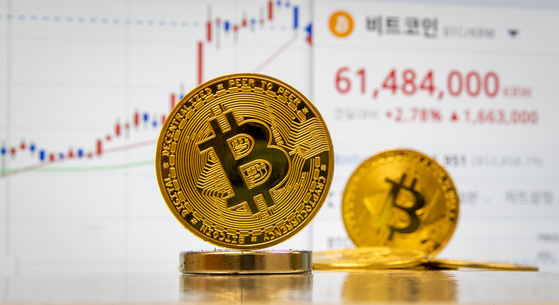Small cryptocurrency exchanges are shaking. There are concerns that commercial banks may close their business by not giving real-name accounts to cryptocurrency exchanges. According to the revised Specific Financial Information Act (hereinafter referred to as the Special Money Act), virtual currency exchanges must secure a real-name bank account.

On the 9th, at the domestic cryptocurrency (virtual currency) exchange, the price of bitcoin exceeded 61 million won each. News 1
‘Crisis Exchanges’ Can’t Get a Bank Account
On the 10th, the Financial Services Commission announced a change in the regulations of the’Inspection and Sanctions Regulations on Reporting of Specific Financial Transaction Information, etc.’ which include the establishment of new standards for imposing fines applied to virtual currency exchanges. Through the change in regulations, the Financial Services Commission can impose a fine for transactions with customers who have not verified their real names. The fine for negligence is set at 30-60% of the legal maximum amount (100 million won) depending on the materiality of the case.
With the enforcement of the Special Money Act two weeks ahead, cryptocurrency exchanges are struggling to find bank accounts. There are more than 100 cryptocurrency exchanges in Korea, but only four of them open real-name accounts with banks and transact with Bithumb, Coinone, Upbit, and Kobit. The rest of the exchanges operate in an anomalous way, in which investors deposit money into the exchange’s corporate account.
Banks have to sign a contract until September, when the six-month grace period for the revised law ends, but there is no reason to risk giving an account to a small and medium-sized exchange.
An official from a commercial bank said, “I am worried that an accident will explode at the exchange,” and “I will not easily open an account unless the stability and transaction volume are at the level of the four major exchanges that have already signed an agreement with the bank.”
Controversy over solidarity responsibility… Authorities “should be determined by business partners themselves”
As such, the reason that banks are passive in opening accounts is due to the structure of’solidarity responsibility’ in which they must guarantee the stability of the exchange. The Financial Services Commission has allowed banks to evaluate the stability of cryptocurrency exchanges themselves. It is said that the bank should open an account after determining whether it is a reliable exchange.
Of course, if there is no exchange of money (won) with virtual assets, there is no need to check the real name account. However, in this case, the exchange is disadvantageous in competition because it cannot open a market for converting cryptocurrency into KRW and can only broker transactions that exchange one coin for another type of coin.

Bitcoin price displayed at Bithumb Gangnam Center in Seoul on the afternoon of the 9th. yunhap news
Another commercial bank official said, “A bank that does not have supervisory authority has been struck by the exchange’s leash.” “It has the advantage of receiving fees and increasing the receiving account. “Because of the greater risk to take along with the responsibility, the atmosphere is not actively rushing,” he said.
For this reason, it is predicted that after a grace period of 6 months, a large number of small cryptocurrency exchanges will be closed or operations will be reduced, resulting in massive restructuring.
Banks are making joint evaluation guidelines centered on the Banking Federation. It is known that they are discussing whether to comply with the guidelines for preventing virtual currency money laundering and whether they have a privacy protection system.
An official from the Financial Services Commission said, “It is up to the bank to decide which partner to choose when entering a new business, and it is capable enough. It is rather unnatural for the authorities to decide which exchange to do business with, and market intervention is controversial. “It will bring about.”
Reporter Jiyu Hong [email protected]
![]()
